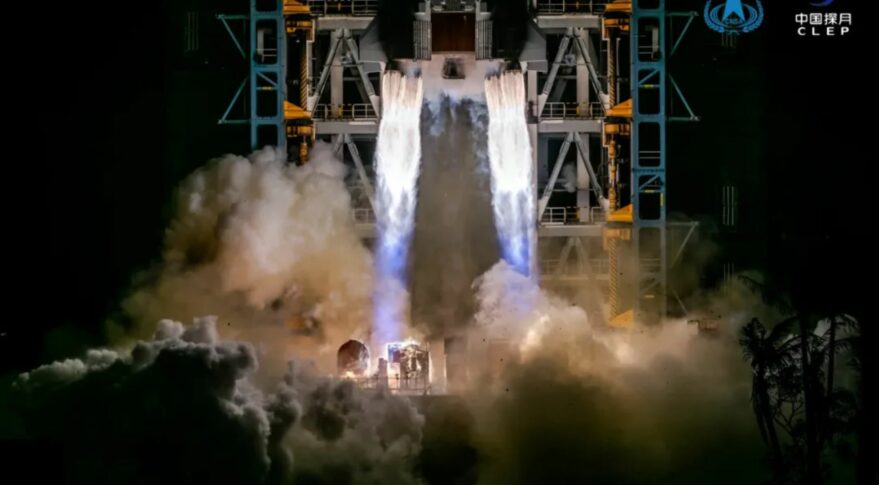Shanghai rocket maker considering developing huge methane-fueled rockets
by Andrew Jones —

PARIS — A major arm of China’s state-owned space contractor is looking at developing a series of partially and fully-reusable launch vehicles apparently in response to SpaceX’s Starship.
A paper published in the journal Aerospace Technology outlines plans under consideration by the Shanghai Academy of Spaceflight Technology (SAST) for a number of launch vehicles with varying diameters and clusters of methalox engines.
A first generation of three launch vehicles with reusable first stages would have diameters of 3.35, 4.0 and 7.0 meters, powered by clusters of five, seven-to-nine and 9-22 “Longyun” 70-ton-thrust engines. Second stages would use vacuum-optimized versions of the engine.
The 3.35m version is to be capable of lifting 2,500 kilograms to a 700-kilometer sun-synchronous orbit (SSO), while the 4.0m variant—a size chosen to meet the maximum which can be transported to China’s inland launch sites—could launch up to 6,500 kg of payload to a similar orbit.
The 7.0 meter version is planned to be able to launch more than 20,000 kg to 700 km SSO, while requiring new launch facilities and an offshore platform for recovering the first stage.
Well now. The Shanghai Academy of Spaceflight Technology is looking at methane-LOX reusable VTVL launchers, using open cycle engines from private firm Jiuzhou Yunjian. Diameters of 3.35, 4 & 7 meters & eventually a 9-10m diameter, 2-stage, fully reusable 100 tons to orbit monster pic.twitter.com/Mx5vopYVPb
— Andrew Jones (@AJ_FI) September 15, 2022
The paper states that the technologies needed for a first generation of reusable launch vehicles, including grid fins, navigation guidance and control, and reusable, restartable engines, has advanced to the point of being ready for flight demonstrations. Tests would include low velocity and low altitude flights, building up to 100-kilometer-level launches.
Though not explicitly stated, the 70-ton-thrust open cycle Longyun engines correspond to a product of the same name and capability developed by private firm Jiuzhou Yunjian. This would be a notable instance of a state-owned entity contracting a private company for engines.
China opened up portions of its space activities to private capital in late 2014, resulting in hundreds of firms entering the sector. A number of companies have developed methane-liquid oxygen rocket engines for their own launch vehicles, including Landspace and iSpace, but Jiuzhou Yunjian has focused solely on engines.
The firm signed a deal in October 2021 to supply its Longyun and smaller Lingyun engines to launch vehicle maker Rocket Pi for its Darwin-1 launcher.
The proposed launch vehicles would also provide a different path to developing new launch capabilities in China, separate from those being developed by the Beijing-based China Academy of Launch Vehicle Technology (CALT).
SAST and CALT are two major institutes under the China Aerospace Science and Technology Corporation (CASC), the country’s state-owned main space contractor. Both produce Long March launch vehicles, providing different launch capabilities but also a level of competition.
CALT manufactures the large, kerosene-liquid oxygen Long March 5 and 7 rockets and is also developing the kerolox super heavy-lift Long March 9. CALT officials have also presented concepts for reusable, methalox launchers and a methane-powered version of the Long March 9.
SAST is also eyeing a second generation methane rocket for which both stages would be reusable and be capable of delivering 100,000 kg to low Earth orbit.
The rocket would have a diameter of 9-10 meters, similar to the Long March 9, and use 25-28 200-ton-thrust, closed-cycle engines on its first stage. The second stage would feature 6-9 engines.
China has been looking at numerous ways to boost its access to space in recent years, including a range of solid propellant rockets and reusable liquid launch vehicles from the state sector, as well as privately-developed capabilities.
China’s first methalox rocket, Zhuque-2 developed by private firm Landspace, is expected to launch from Jiuquan in the near future.
